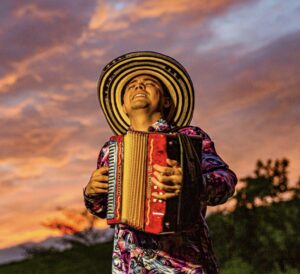Yeison Landero says he had “a beautiful childhood” in the green mountains of San Jacinto, Bolívar, in northern Colombia. Famous musicians came to his house: accordion players Alfredo Gutiérrez, Lizandro Meza, Calixto Ochoa, and Enriquez Díaz; composer and singer Adolfo Pacheco; and assorted notable pipers and singers. Only now, says Landero, “do I realize the value of how I was living.” It was an extraordinary thing, he says, “to meet living legends.”

When Yeison was eight years old, his grandfather gave him an accordion and began to teach him to play it. His grandfather, who died in 2000, was Andrés Landero — a prolific self-taught accordionist and singer known as “the King of Cumbia.”
Landero still has two accordions, “like museum pieces,” passed down to him by his grandfather. Sometimes he carries one to his shows in Colombia, “as a luck thing,” he says. But he won’t play them in performance. Instead, he says, he’s constantly getting new accordions. That’s because the music is so demanding. The squeezing and expanding of the box, necessary for the constant motion of the music, can take a toll on the instrument. As if they are dancers, “I need the instruments to be in very good shape,” he says.
Cumbia is a style of folk music — also a flirtatious, ritual courtship dance — that originated on the Caribbean coast of Colombia, and which is thought to combine the music of three ethnic groups: Indigenous Colombians and the African and Spanish people who arrived there in colonial times.
Landero plays a style of cumbia that his grandfather adapted, which transposes harmony and melody suited to “gaitas,” traditional long wooden flutes, to the accordion. Landero and his band will perform on Thursday, July 24 at the Orleans-Eastham Elks Lodge in a concert presented by Secret Planet Cape Cod, a co-production of Cape Symphony Presents and Narrowland Music.
For Landero, cumbia and family are inseparable. His guacharaca player, Javier Guerra, is his uncle, who played with Andrés for 25 years. The guacharaca is a Colombian percussion instrument played by scraping a special fork against a ridged wooden tube about as long as a violin. Daniel Movilla plays the caja, a small drum. Jeiver Rodriguez plays the gaita, Aníbal Hernández the bass, and Andrés Ramirez the drums. To perform isn’t just to activate an audience — although the pounding heartbeat of cumbia is thrilling — but to represent Landero’s family’s history onstage: “To spread the legacy of my town,” he says.
“Cumbia is the spine of Latin American music,” says Landero. Its steady, forceful rhythm — a 2/2 or 2/4 meter, involving two beats per measure — encourages the movement of hips and heads. The melody wanders modally in earnest solos; the drums engage in the dialogue, often syncopated — the essential rhythm complicated but never compromised.
“Cumbia is love,” says Landero. “It’s freedom, it’s resilience, and it’s legacy.” Cumbia is so inseparable from the musicians and dancers who perform it that those people are called “cumbiamberos.”
Cumbia is also “resistance,” says Landero. “It’s music from farmers, from very humble people, but with a very deep message of love.” The blending of instruments and rhythms represented not only the merging of cultures but the assurance that those cultures would survive wherever the music might be performed.
Landero loves performing for Latin Americans in the U.S., he says. “To bring them hope and the deepest memories of their families,” he says. “But it’s also very interesting for me how we are charming the hearts of American people who have never had the cumbia experience.
“I love to see how they dance, how they join,” he adds. “They say that this music will stay with them.”
Landero graduated in 2008 from the University of Cartagena with a law degree. “At the same time that I was studying law, I was also making music,” he says. “It’s always been with me.” The degree has been useful, he says. It helped him create a foundation to put on Cumbia Fest, an annual gathering whose main goal, he says, is to “spread and preserve the traditions and give children the chance to explore the music.”
On Thursday, Landero will perform a set that includes some of his grandfather’s repertoire: songs like “Cuando Lo Negro Sea Bello” and “La Pava Congona.”
Those songs move forward on foundational two-beat heartbeats, unstoppable and insistent. On recordings, Andrés’s voice is unornamented and pure. His accordion playing is virtuosic, responding ecstatically to what he sings.
Landero will also perform his own songs: “Campasino Cimarrón,” “Noche de Cumbia,” “La Epoca de Oro.”
In “Noche de Cumbia,” Landero sings of the “fire” in a dancer’s hips. His accordion leaps; the drums continue their unyielding, hypnotic motion. “Play it, play it!” he shouts in Spanish. “Move those hips!” Most of the songs include enthusiastically shouted encouragement — as if the songs can’t exist without dancers present. “Andrés Landero,” says Yeison. “Here is your dynasty! Ha!”
Landero has released only one album, in 2018: a nine-track record called, aptly, Landero Vive —that is, Landero Lives.
“I can show to the people that, of course, I’m keeping my grandfather’s legacy alive,” he says. “But I’m also bringing my own compositions, my own creativity.” Legacy is something that must be actively created, and Landero is making his own.
This article was written with the assistance Javier Mutis, Yeison Landero’s manager, who translated Landero’s answers from Spanish to English.
Musical Material
The event: Yeison Landero plays cumbia
The time: Thursday, July 24, 6 p.m.
The place: Orleans-Eastham Elks Lodge, 10 McKoy Road, Eastham
The cost: $35 at secretplanetcapecod.org



